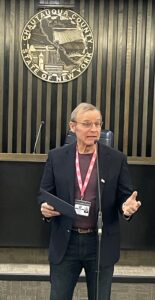‘Hibernation Mode’
Campgrounds Adjust To Summer of COVID-19
- Pictured is Camp Mission Meadows in Dewittville. P-J photo by Cameron Hurst
- Hidden Valley Camping Area is one campground adjusting to a summer season due to be impacted by COVID-19. P-J photo by Cameron Hurst

Pictured is Camp Mission Meadows in Dewittville. P-J photo by Cameron Hurst
As the weather gets nicer, campgrounds — both seasonal and program-based — across the country are beginning to adjust to a summer operating in the midst of the COVID-19 outbreak.
Hidden Valley Camping Area, a seasonal campground, is one of several sites locally that are working with the Chautauqua County Health Department so as to operate safely under New York State guidelines, which originally led them to close recreational amenities, public bathrooms and accept self-contained RV registrations only. There were also strict limitations on visitors.
But, as of Tuesday, some of those restrictions had been lifted.
“Due to the new executive orders, we are allowed groups of 10 or less at campsites now with social distancing,” co-owner Jessica Spak said. “We are now allowing guests as long as campsites stay within that limit. Our bathrooms are now open as well as our tennis court. Our camp store is also open with modifications.”
And while regulations do prevent some of the recreational activities the site is commonly known for, Spak is just happy that Hidden Valley can serve an outlet for those looking to get out of the house.

Hidden Valley Camping Area is one campground adjusting to a summer season due to be impacted by COVID-19. P-J photo by Cameron Hurst
“For us, we feel like camping is a safe way to get out of your house,” Spak added. “You have your own unit, your own bed and you can get outdoors and properly socially distance and go for a bike ride or a walk and do something even though some of our recreation is closed.”
Still, operating conditions have been a bit cumbersome and registrations have gone done in the weeks since the outbreak began.
“Our operating conditions are less than ideal right now, but for the most part, our campers are adjusting fantastic and are just grateful to get out here and camp and we’re grateful that we’re open,” Spak added, noting that patrons expecting to visit the National Comedy Center and other tourist attractions are canceling their trips due to their closures.
“Because nothing is open, there’s no reason for them to travel,” she said. “A lot of those people that are traveling across the country are just re-looking at their plans.”
Program-based summer camps — like Camp Mission Meadows in Dewittville and Boy Scouts of America-owned Camp Merz in Mayville and Elk Lick in Smethport — meanwhile have suspended in-person camping.
“Our main concern, first and foremost, is everyone’s safety and health and wellbeing,” Bryan Muecke, Camp Mission Meadows Executive Director, said regarding the organization’s decision to suspend standard programming until August 8.
“We want to make sure that we were not contributing to the spread of this virus,” he said. “When the CDC began to release the restrictions on group gatherings and group sizes, just the nature of what we do: camp is a group activity, so if we cannot have groups together … it makes it hard to deliver our program. We just felt it was best to basically go into a hibernation mode as an organization and just try to wait this out.”
Nathaniel Thornton, scouting executive for the Allegheny Highlands Council, said that his organization has tried to provide-at home activities for scouts, branded as “Camp Cooped Up.” The Boy Scouts of America also sponsored a virtual “Camporee” this past weekend.
“They’re basically daily activities that can be done from home,” he said. “We want to provide homemade activities for parents to do with their kids, break up the monotony of staying in the house. These are just additional opportunities for those of us who are stuck at home, trying to teach kids.”
For Mission Meadows campers, a virtual family camp session held on Memorial Day weekend was the organization’s first opportunity to test out what Muecke hopes will be a viable option to continue programming into the summer.
“That will be our first go-around with that and then we’re going to try and develop that more so that we can follow our summer calendar how it’s laid out on our website and our brochure,” he said last week.
Most of all, Thornton and Muecke want to provide opportunities for social interaction for kids who are feeling socially isolated.
“That’s obviously the main concern for us and our program,” said Muecke, who noted that his organization provides experiences for nearly approximately 700 to 800 campers each summer.
“The social piece is a huge part of what we offer and maybe camps are becoming somewhat unique in the life of our kids where we are one of the only places outside of school where there is face-to-face interaction.”
“The greatest challenge right now is that we provide those leadership opportunities and allow kids to be able to socialize and not being able to do that and not being able to take on those leadership opportunities, that’s become a challenge,” Thornton said. “I think there’s a little Zoom fatigue as well. Not just the parents, but our kids are sitting on Zoom meetings all day for school and try to get them on in the evening, it’s challenging.”
“We’re just trying to keep our camp community connected as best we can,” Muecke said. “It lets people know that we are going to be here when this time of hibernation and isolation can be lifted. We’ll be back, providing in-person programming when the time is right.”







